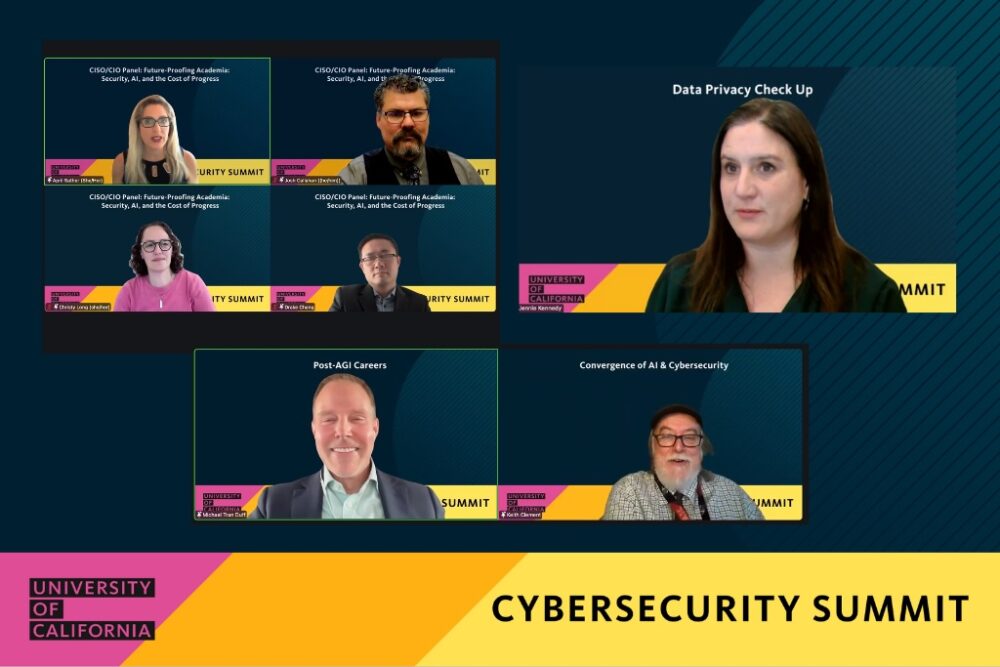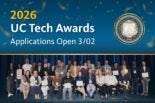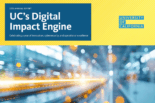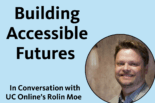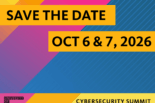Kicking off the second day of the 2025 UC Cybersecurity Summit, Jennie Kennedy, Chief Privacy and Data Protection Officer at the University of Texas System, shared an eye-opening session on the realities of data privacy in the age of AI during the 2025 Cybersecurity Summit. Using humor to add levity to the seriousness of privacy topics, Kennedy reminded us that while AI tools are powerful, we need to be intentional with how we use them — asking the right questions, checking our settings and knowing where our data is going.
“The more sensitive my data is, the more I want to know where it’s going, who’s using it and whether I have the ability to opt out.” – Jennie Kennedy
Kennedy was just one of several voices during the 2025 Cybersecurity Summit. The event was virtual this year; a decision that aligned with the University’s ongoing efforts to implement cost-saving measures.
On August 19-20, 2025, over 800 attendees logged in for the event with a theme of Building Resilient Communities. Information technology professionals explored recurring themes of AI, privacy, risk, vulnerabilities and much more. Attendees from the University of California system, California State University and California Community Colleges listened to cybersecurity professionals from these higher education institutions, as well as Stanford, University of Texas, University of Oregon, Harvard, and public sectors. Monte Ratzlaff, UC Chief Information Security Officer (CISO), was the event moderator.
To learn more about the even, view the event Program Book, which includes the agenda, speaker bios, and more.
Highlights from the Main Stage
From Nandita Bery, Director of Cybersecurity at Equinix, on the human side of cybersecurity to Sunny Notani, Special Agent for the US Secret Service, on online scams, the two days were packed with insights, real-world experiences and predictions.
Bery shared powerful insights on how AI is reshaping the human side of security and important characteristics to look out for.
“AI is a game changer for criminals, allowing them to craft attacks that are more personal, scalable and convincing,” she said. The message was clear: building a stronger, more resilient community is our best defense.
During sessions on AI, Dr. Chris Mattmann, Chief Data and AI Officer at UCLA, and Dr. Neil Daswani, Co-Director at the Stanford Advanced Cybersecurity Program, shared critical insights into both the promise and the risks of AI. Their discussion highlighted how AI can drive innovation across research and institutions, while also exposing new challenges such as hallucinations, jailbreaks (e.g., tricking AI into bypassing its safeguards) and the looming possibility of large-scale breaches. “AI is moving fast, but governance, alignment and explainability must move with it,” explained Mattmann. Daswani shared, “Almost every AI model has hallucinated. They’re trained on both correct and incorrect data, without real-world understanding.” Security, governance and proactive defenses must evolve alongside innovation.”
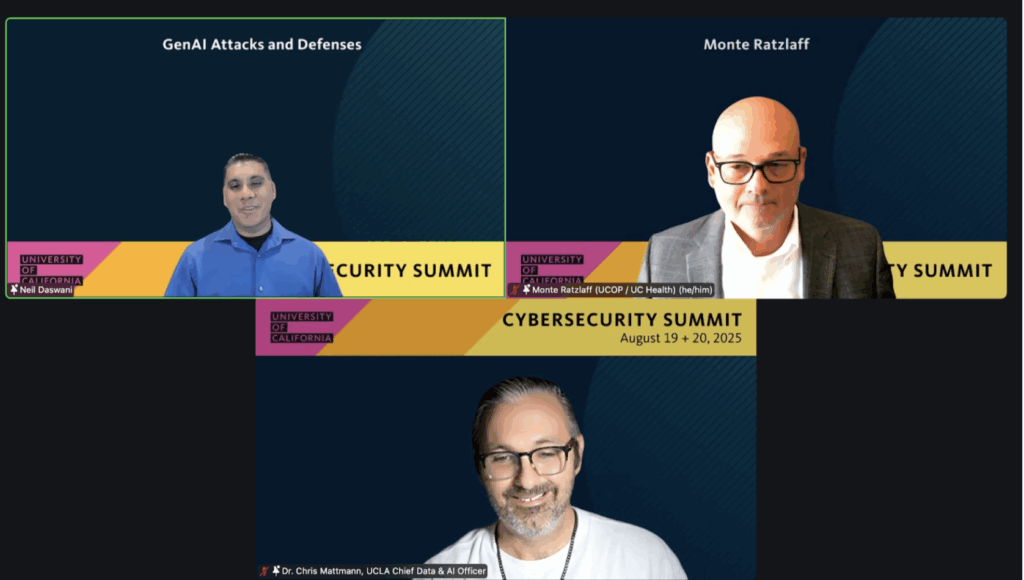
On day two, Dr. Keith Clement of CSU Fresno emphasized the convergence of AI, data, and security training, urging educators to build adaptive pipelines that prepare students for AI-driven threats. Michael Tran Duff of Harvard University discussed the rise of artificial general intelligence (AGI) and its impact on future roles, highlighting the growing importance of leadership in ethics, oversight, and managing virtual expert teams.
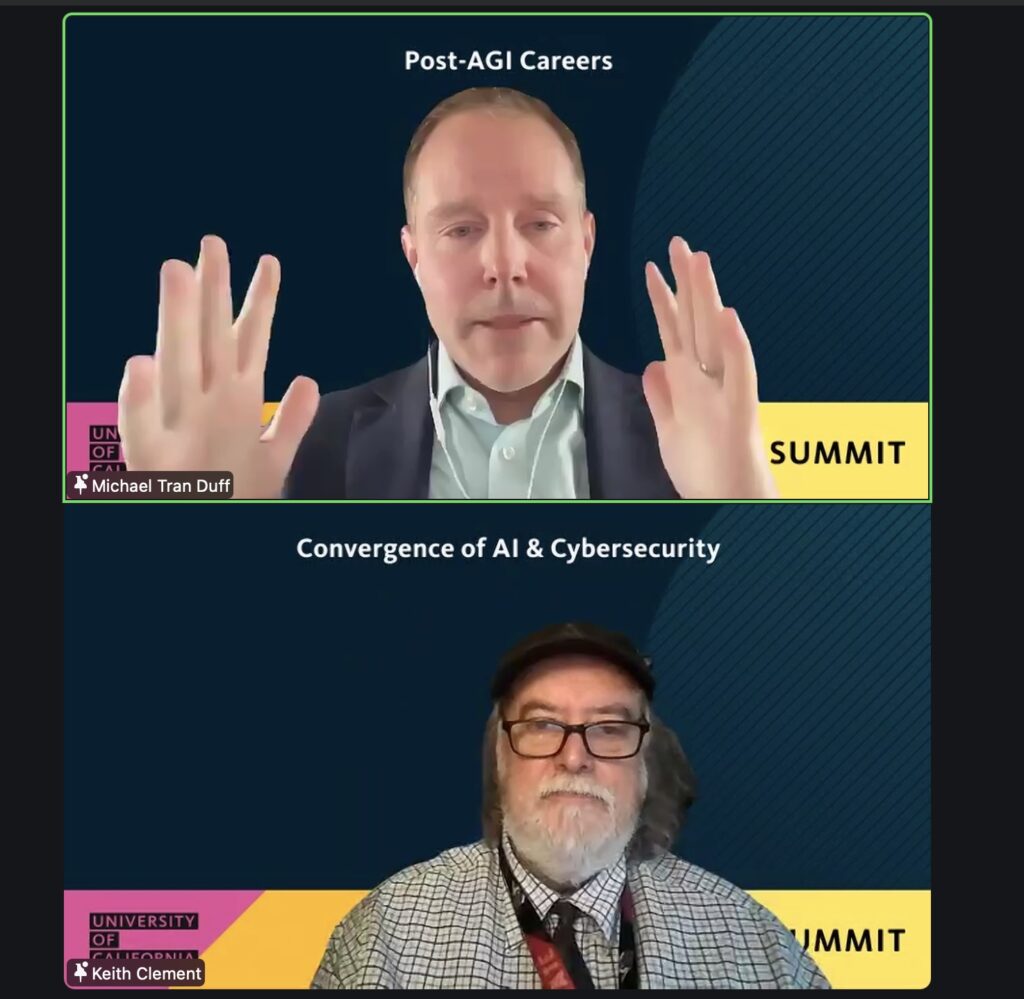
Closing out the event, Notani highlighted how we can protect ourselves by staying alert to online scams and taking simple steps to avoid engaging with them. He shared, “The criminals don’t stop evolving their scams, so neither can we.” An important tip from Notani is to verify before you comply, as 95% of all social engineering scams would have failed if the victim had made one follow-up phone call to verify what was being shared.
Leadership Panel with CISOs and CIOs
April Sather, UCOP CISO, moderated a CISO/CIO panel with Josh Callahan, CISO at California State University; Christy Long, Associate CIO and Chief of Staff at the University of Oregon; and Drake Chang, CISO at UCLA to discuss how universities can balance innovation with rising risks and costs. The panelists shared their thoughts on security and innovation, and how they must work hand-in-hand. Higher education can’t face AI-driven risks in isolation—it requires collaboration, shared investment and a people-first approach to build resilience for the future.
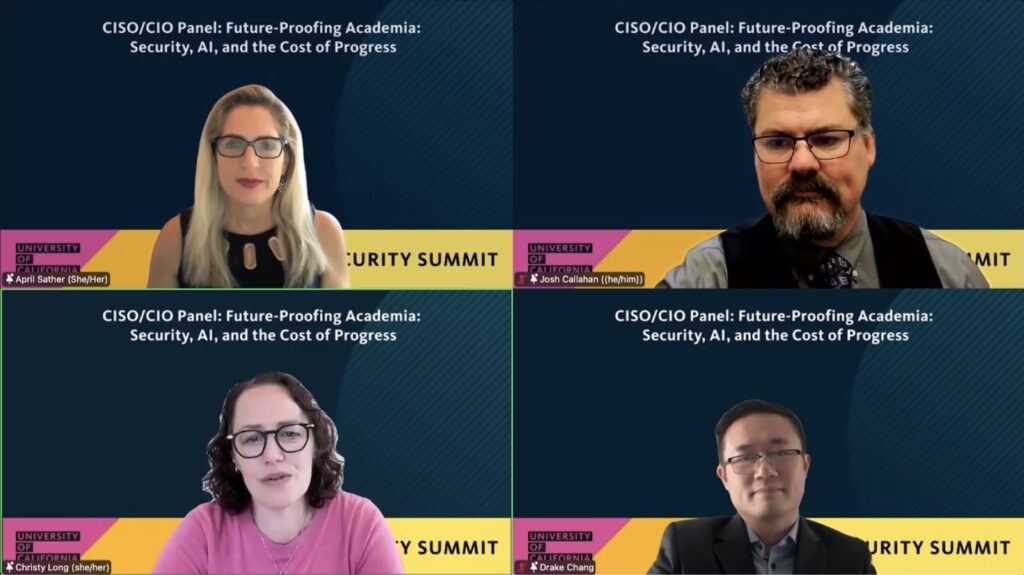
Chang shared his thoughts on AI: “AI is both a sword and a shield. To stay secure, we must fight fire with fire.”
Long shared that higher education has an important role to play in how AI can serve society broadly — but we cannot do it alone. Callahan agreed, stating that “Workforce development is a shared responsibility — we must reskill, retrain, and prepare graduates, alumni, and employees to thrive in an AI-driven economy.”
Building Connections
This year’s Summit introduced breakout rooms—eight fast-paced, 25-minute discussions led by professionals on a range of timely topics. Sessions included:
- Life as a CISO: Ask Me Anything - Allison Henry, UC Berkeley Chief Information Security Officer
- Scaling Research Security Compliance: Navigating Complexities and Accelerating Adherence in Diverse UC Research Enterprise - Jackson Muhirwe, UC Santa Barbara Chief Information Security Officer
- Protecting UC in the Midst of Geopolitical Turmoil - Pat Phelan, UC San Francisco Chief Information Security Officer
- Third Party Security Risk in Higher Ed - Damian Luna, UC Cyber Risk Assessment Unit Manager
- From Awareness to Risk: Modernizing UC’s Human-Centric Security Strategy - Cecelia Finney, UC Program Director, Cybersecurity Awareness & Human Risk Management
- Forensics/Investigating Cyber Incidents: Sponsored by Fortinet – Aamir Lakhani, Fortinet
- Why Your Cyber Program May Feel Stuck – and What Leading Teams Are Doing Differently: Sponsored by Trellix - Zak Krider, Trellix
- Overcoming Common Problems in Security Operation Centers (SOC) Operations: Sponsored by Palo Alto Networks – Michael Gregg, Palo Alto Networks
Also new this year was a 25-minute speed networking session where participants joined a small group online to introduce themselves and discuss various security topics.
Community by the Numbers
This year’s Summit drew a mix of newcomers and veterans. Registration data shows that almost 57% were first-time participants, while 10% were seasoned attendees with four or more summits under their belts.
Early feedback from attendees has been overwhelmingly positive, with 93% of the post-event survey responders saying they were satisfied/very satisfied with the virtual experience. When asked about the overall experience, 93% answered that they were satisfied/very satisfied. Some of the responses from the survey included:
“Really enjoyed the summit – great content, great speakers!”
“Super informative and well done. I can’t wait until next year!”
“Great material so kudos to those involved in putting the Summit together.”
Thank you, Sponsors

Looking Ahead: 2026 Cybersecurity Summit
With the success of 2025 behind us, planning for the 2026 Summit is already underway! We’re busy working through the details for this event, so be sure to stay tuned to our website to get the latest news. We look forward to seeing you there!
Know of a great speaker, topic, or idea we should feature? We’d love to hear from you! Please email us at uccybersummit@ucop.edu to share your suggestions.
Contact
UC Cybersecurity Summit Planning Team
Uccybersummit@ucop.edu

